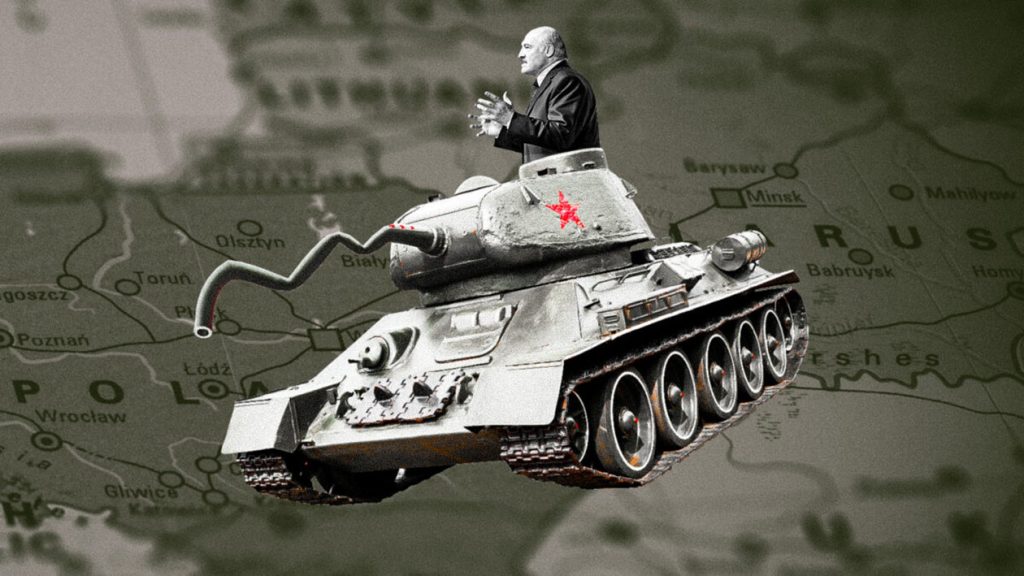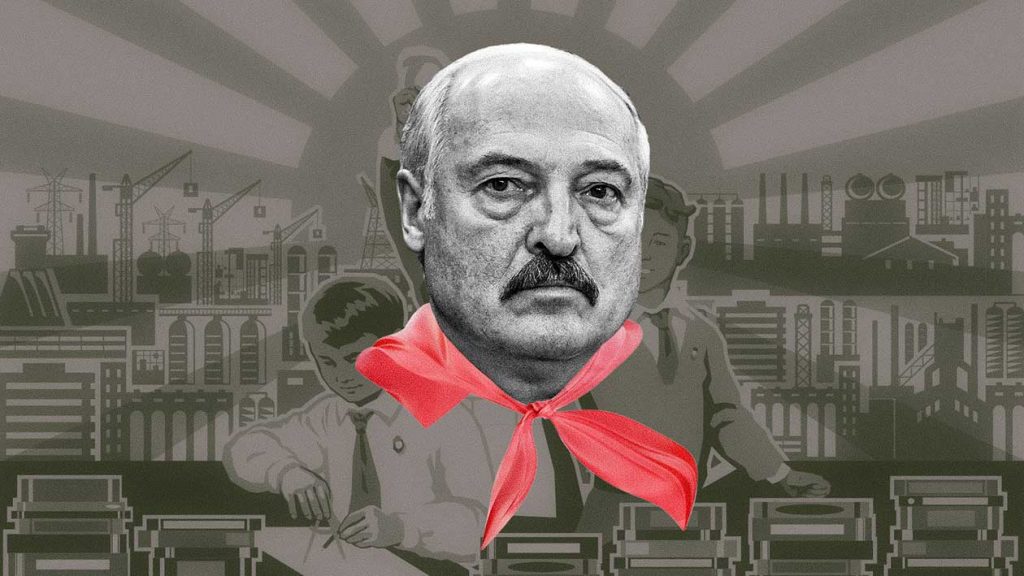In 2021 the Lukashenko regime introduced a new state holiday, “the Day of People’s Unity”, to be celebrated on the 17th of September. With all its propaganda, it has tried to gloss over the fact that the 17th of September is first and foremost remembered as the anniversary of the Soviet attack and invasion of Poland in 1939, which was planned in coordination with Nazi Germany following the Molotov-Ribbentrop Pact, signed in August 1939.
Source — EUvsDiSiNFO — September 16, 2023 —
Table of Contents

The attack on the 17th of September took place as Poland fought the invasion of Nazi Germany in the west, which had occurred just a few weeks previously on the 1st September 1939. This makes the date very special, and prompts strong feelings in Poland and right across Europe. Lukashenko has praised Stalin’s decision to enlarge the Belarus Soviet Republic by integrating regions which had become Polish under the Riga Peace Treaty of 1921. Announcing the public holiday, Lukashenko declared: …. The reunification of the Belarusian nation in 1939 helped the country prevail in the Great Patriotic War. …
In Minsk and other cities, the authorities are now putting up official banners, and organising concerts and ‘patriotic actions’. Lukashenko is expected to deliver a speech, but that has yet to be announced.
Irregular migrants as pressure on the EU
In late August 2023, the ministries of the interior in Poland and the Baltic states held consultations on security cooperation, and the situation in Belarus. They requested the Belarusian side expel the Wagner group from its territory, and discontinue the transportation of irregular migrants and refugees to the Belarus-EU borders. The Polish Border Guard reported 20,700 attempts to cross the border from Belarus without authorisation in January-August 2023. Poland warned Belarus that all its border crossings to EU states may be closed to avert critical incidents, such as shootings or a massive migrant breakthrough.
Lukashenko replied that he would only discuss expelling the Wagner group once foreign soldiers had left Poland and the Baltic states. In other words, he drew a parallel between Wagner mercenaries and NATO soldiers, who operate in partner countries on the basis of international agreements. Lukashenko also instructed his Prime Minister to start talks with Poland. It’s been reported recently that there are now far less Wagner mercenaries in Belarus.
Minsk’s militant rhetoric
Belarusian organisations employ ideologists, many with a background in the security services. Their job is to maintain political discipline and control over workers, and to promote the narratives of the regime. Guidelines for ideologists, published in August 2023, instructed them to spread the allegations about aggression from West states led by the US, the increased militarisation of Poland and the Baltic states, and push the line that the “Ukraine crisis” was due to Western provocation. The guidelines claimed there was an additional threat in the form of an anti-Belarusian information campaign promoted by the West. The tone and concept had many similarities with classic Soviet Agitprop.
The same document justified the creation of the People’s militia in Belarus in July 2023, applauding the role played by the Soviet people’s militia during WWII. This new militarised structure in Belarus is intended to play an active part in “maintaining order” if martial law is imposed as a consequence of this hypothetical Western aggression.
Nuclear weapons lauded…
Belarusian state propaganda tends to portray Poland as the main, immediate threat facing the country, while at the same time attempting to whip up a general fear among Belarusians of so-called western aggression. State TV channels (see here and here), and pro-Kremlin outlets functioning in Belarus (see here and here), claim that Belarus badly needs Russian tactical nuclear weapons to defend itself against an aggressive West, Poland in particular. The state ONT TV channel stated, for instance, that stationing nuclear weapons in Belarus would prevent Poland’s plans to annex the west of the country. This baseless conspiracy about Polish plans to take over western Belarus and/or Ukraine is repeatedly used to push the disinformation narrative of an “aggressive Poland” which, in turn, serves to obfuscate and deflect attention away from the ongoing Russian aggression against Ukraine.
A report on Belarus 1 TV on the 4th of September 2023 argued that stationing nuclear weapons in the country would not be Minsk’s only answer to “Polish militarisation”. It claimed, “Belarusian troop numbers are not growing, but don’t think we are doing nothing about that. If we include the people’s militia and territorial defence troops, the Belarusian army becomes three times larger. It automatically becomes larger than the Polish army”. The report also presented Poland as a growing military threat to countries in the EU, saying, “Europe and the US have created a monster on their territory. Don’t they understand that an army like this [Polish] will threaten not only Belarus and Russia but Europe itself? Germany and Czechia have probably forgotten their history. […] History repeats itself and ends sadly for those who do not learn lessons from it”.
…while internal repression grows
The talk of war and conflict in Belarus goes hand in hand with repression at home. As of the end of August, human rights activists reported that 1,496 political prisoners were held in Belarusian detention and penal facilities. In total, since August 2020, according to the data available, at least 4,898 people have faced politically motivated criminal prosecution, and at least 3,763 people have been convicted in politically motivated criminal trials. As we have documented, the number of these cases is not falling, and human rights activists regularly identify and document instances of torture in the course of investigations into politically motivated criminal cases. We have previously reported on repression in Belarus targeting journalists, civil society, and the population at large, see here and here.
Back to school, or back to the USSR?

Belarus under Lukashenko has long been known for its similarities to the Soviet Union. Over the past three years a trend to glorify the Soviet past and manipulate historical facts for present day political gain has strongly intensified. Children in particular seem to be a target audience of this ideological manipulation. The Ministry of Education and the General Prosecutor’s House have together prepared three types of schoolbook covering the topic of “the genocide of the Belarusian people” in WWII for different pupil age groups.
Speaking to the Belarus 1 TV channel in an interview to mark the start of a new school year on 1 September 2023, the Belarusian Minister of Education, Andrei Ivanets, announced that by 2027 all school textbooks would be edited to make them “as close as possible to the ones we had in Soviet times”. The Minister criticised an exercise in the current Russian language textbook for second-year pupils which mentioned the “map of forest elves”. “This is probably a fun task for children, but what does it have to do with cultivating love for the Motherland?” Ivanets asked. The Soviet textbook from 1982 offered much more practical exercises, such as praising the Soviet Constitution, and understanding how the authorities work, he argued.
The Lukashenko regime is “mobilising” history and has a very direct and USSR-like instrumental approach to how society should be organised, especially for pupils and students. In a recent statement from the Deputy Head of the presidential administration Igor Lutsky: “We’ve started working with young people, with the younger generation. We’re trying to include all target audiences in our attempts to explain the state position. And everything that is good for the state is good for every citizen. Everything that is good for the person is good for sovereignty.”
The future of our country depends on…. the memory of the USSR
Over the past three years, hundreds of schools across Belarus were renamed after Soviet heroes, to encourage Belarusians to commemorate them. Secondary school №35 in the city of Brest, for instance, was renamed after the USSR marshal Konstantin Rokossovsky.
The genocide narrative appeared in 2021 as part of a propaganda campaign to discredit popular dissent. In itself, there is obviously nothing wrong with discussing WWII with schoolchildren, given the long-lasting pain it caused to the Belarusian people. Context matters, however. Since the large scale protests of 2020, the regime’s heavy and steady manipulation of WWII history has included drawing parallels between Nazi Germany and present day Western countries and the EU, and between Nazi collaborators and the political opponents of the Lukashenko regime.
While Lukashenko turns up the volume on his propaganda, the 17th of September is a date to remember the horrors of repressive and totalitarian systems, and work for the good of Europe.










